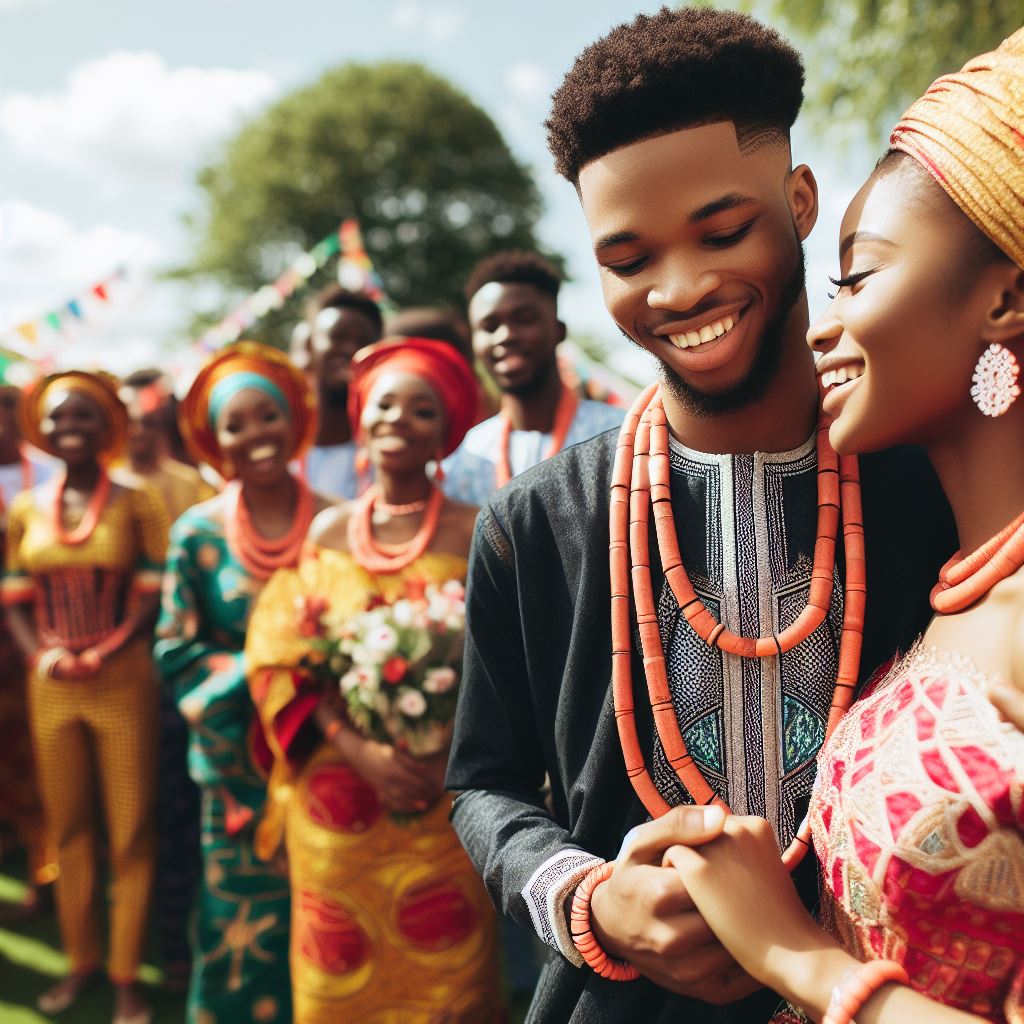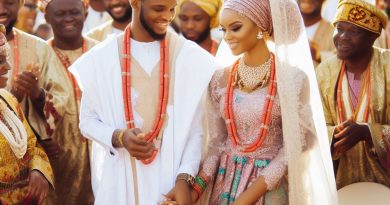Yoruba Engagement Ceremony: A Colorful Expression of Love
Last Updated on October 13, 2023
Introduction
Exploring Yoruba Engagement
Uncover the profound significance of the Yoruba engagement ceremony, a cherished tradition deeply woven into Yoruba culture for generations.
Discover how this unique event serves as a bridge between families and a celebration of love.
Unveiling Tradition
Dive into the rich customs, colorful rituals, and meaningful symbols that characterize the Yoruba engagement ceremony.
Explore the intricate process of proposing, negotiating the bride price, and exchanging gifts, all steeped in cultural significance.
Learn about the beautiful attire worn by the couple and guests, each piece telling a story of heritage and identity.
Delve into the rhythmic music and dance that enliven the occasion, filling the air with joy and excitement.
Preserving Heritage
Recognize the pivotal role of preserving and cherishing these cherished traditions in today’s Yoruba culture.
Despite the influence of modernization, Yoruba engagement ceremonies stand as a testament to the resilience of cultural heritage.
Discover how young couples, while embracing contemporary elements, continue to honor the timeless customs of their ancestors.
Explore the sense of unity and pride that these ceremonies instill in Yoruba communities, fostering a strong sense of identity and belonging.
As we journey through the celebration of Yoruba engagement ceremonies, let us celebrate the enduring love, cultural richness, and vibrant traditions that define this cherished occasion.
Historical background of Yoruba engagement ceremony
Origins of the Yoruba people and their traditions
- The Yoruba people are one of the largest ethnic groups in Nigeria, West Africa.
- They have a rich cultural heritage that is rooted in centuries-old traditions.
- The Yoruba people believe that they are descendants of Oduduwa, who was a divine figure.
- Oduduwa is believed to have been the progenitor of the Yoruba people and the first king of Ife, the ancestral city.
- The Yoruba people’s traditions are deeply intertwined with their religious beliefs, which include the worship of various gods and ancestral spirits.
- The Yoruba culture emphasizes respect for elders, communal living, and the preservation of cultural values.
Influence of Yoruba engagement ceremony by historical events
- The Yoruba engagement ceremony, known as “Igba Nkwu,” has evolved over time in response to historical events.
- During the pre-colonial era, Yoruba society was organized into city-states, and engagement ceremonies served to strengthen alliances between families and kingdoms.
- The ceremony was an opportunity to showcase the wealth, status, and influence of the families involved.
- It was also a way to ensure the continuity of the Yoruba culture by promoting marriages within the community.
- The arrival of European colonialists in the 19th century significantly impacted Yoruba engagement ceremonies.
- European influences, such as Christianity and Western education, introduced new elements into the ceremony.
- Today, Yoruba engagement ceremonies incorporate both traditional and modern elements, reflecting the dual influences of history and globalization.
- The engagement ceremony typically takes place before the wedding and involves the exchange of gifts between the families of the couple.
- The groom’s family presents the bride’s family with items such as kola nuts, palm wine, and yams as a sign of respect and gratitude.
- The bride’s family, in turn, may present the groom’s family with gifts such as clothes, jewelry, or even livestock.
- These exchanges are symbolic of the commitment of both families to support and celebrate the union of the couple.
The Yoruba engagement ceremony is an integral part of Yoruba culture and serves as a colorful expression of love.
The historical background of the Yoruba people and the influence of historical events have shaped and influenced the ceremony throughout the years.
Traditional pre-engagement activities
In Yoruba culture, the engagement ceremony is a significant event that symbolizes the union of two families and the beginning of a lifelong commitment between a man and a woman.
Before the actual engagement ceremony takes place, there are several traditional pre-engagement activities that both families participate in.
These activities play a crucial role in establishing a strong bond between the families and ensuring a successful union.
Introduction of families
The pre-engagement process begins with the groom’s family visiting the bride’s family to formally announce their intention to marry.
This introduction is an opportunity for both families to become acquainted and establish a foundation of mutual respect and understanding.
Introduction of the groom’s family to the bride’s family
Once the families have been introduced, the groom’s family is formally introduced to the bride’s family.
This introduction provides an opportunity for the families to get to know each other better and establish a sense of familiarity and unity before the engagement ceremony.
Exchange of formal greetings
During this stage, formal greetings are exchanged between the two families as a sign of respect and honor. Customarily, the eldest members of both families take the lead in exchanging greetings.
This gesture symbolizes the recognition of the union and signifies the beginning of a harmonious relationship between the families.
Presentation of gifts and tokens to the bride’s family
The presentation of gifts and tokens to the bride’s family is a crucial part of the pre-engagement activities.
The groom’s family presents a variety of gifts, which can include jewelry, clothing, money, and other valuable items, to the bride’s family as a symbol of their appreciation and commitment.
These gifts also serve as a demonstration of the groom’s ability to provide for his future wife.
Review of the bride’s family’s consent and blessings for the engagement
Before proceeding with the engagement, the bride’s family reviews the groom’s family’s intentions and seeks their consent and blessings for the union.
This step is important in Yoruba culture as it shows respect for the bride’s family’s wishes and ensures that the engagement is agreed upon by all parties involved.
Once the bride’s family gives their consent and blessings, the engagement can move forward.
Traditional pre-engagement activities in Yoruba culture are essential in establishing a strong foundation for the engagement ceremony.
Families introduce each other, exchange formal greetings, present gifts, and review consent, fostering celebration and securing a harmonious future for the couple.
These pre-engagement activities not only showcase the vibrant and expressive nature of Yoruba culture but also emphasize the importance of family and community in the celebration of love.
Read: Benefits of Seeking a Marriage Counselor Early in Conflict
Traditional Engagement Activities
Arrival of the Groom and his Entourage
The engagement ceremony begins with the groom’s arrival, accompanied by his family and friends. They are greeted with joy and excitement by the bride’s family.
Introduction of the Groom to the Bride’s Family
The groom is led to the bride’s family, where he is introduced to her parents and immediate relatives. This formal introduction is a sign of respect and acknowledgement.
Presentation of More Gifts and Tokens
The groom’s family presents additional gifts and tokens to the bride’s family as a gesture of goodwill. These gifts can vary from money, clothing, jewelry, or traditional items.
Exchange of Dowry between Families
The highlight of the engagement ceremony is the exchange of dowry between the families.
The groom’s family presents a predetermined amount of money or valuable items as a symbol of their commitment and support.
Formal Acceptance of the Dowry by the Bride’s Family
Once the dowry is presented, the bride’s family formally accepts it, signifying their acceptance of the groom into their family. This acceptance strengthens the bond between the two families.
Blessing and Prayers for the Couple’s Future
After the exchange of dowry, a special blessing and prayer session takes place. The family members and guests offer prayers for the couple’s future happiness, success, and a blissful married life.
The traditional engagement activities in a Yoruba ceremony follow a structured and meaningful process.
From the arrival of the groom to the blessing and prayers for the couple’s future, each step represents the foundation of a lasting love and a harmonious union.
Read: The Song of Solomon: Exploring Love and Marriage
Ceremony attire and accessories
Traditional Yoruba outfits for the couple and their families
The Yoruba engagement ceremony is known for its vibrant and exquisite traditional outfits.
The couple typically wears matching outfits called “aso-ebi,” which are made from unique and colorful fabrics.
The bride’s outfit, known as “iro and buba,” consists of a wrap skirt and a loose-fitting blouse adorned with intricate embroidery.
The groom, on the other hand, wears a “buba” (a flowing top) paired with “sokoto” (loose-fitting trousers) and an embellished “fila” (cap).
The families of the couple also dress in matching outfits to show their unity and support for the union.
The Yoruba traditional attires showcase the rich cultural heritage and sense of identity of the couple and their families.
Significance of specific colors in Yoruba engagement ceremonies
Colors play a significant role in Yoruba engagement ceremonies, symbolizing various aspects of the occasion.
Red, for example, represents love, passion, and prosperity, making it a popular choice for the couple’s attire.
White symbolizes purity and simplicity, often worn by the bride as a reflection of her innocence and new beginning.
The couple and families incorporate gold in their outfits and accessories, symbolizing wealth and royalty. Other colors hold cultural significance.
The careful selection of colors adds depth and meaning to the overall ambiance of the engagement ceremony.
Cultural accessories worn by the couple and their families
In addition to the traditional outfits, Yoruba engagement ceremonies are adorned with culturally significant accessories.
The bride often wears ornate beads known as “ileke” or “ileke-idi,” which symbolize beauty, wealth, and femininity.
The groom may wear a “fila” made of aso-oke, a hand-woven fabric that signifies his heritage and social status.
Families may also wear accessories such as “gele” (headscarves) and “iro” (wrappers) to complement their outfits.
These accessories not only enhance the visual appeal but also serve as a way to honor and embrace Yoruba traditions.
The combination of traditional outfits and cultural accessories creates a visually stunning and culturally significant atmosphere.
Read: Marriage and Divorce: What the Bible Really Says

Traditional rites and rituals during engagement
A Yoruba engagement ceremony is deeply rooted in tradition and is marked by various rites and rituals.
Blessing and pouring of libations
The ceremony begins with the pouring of libations to seek blessings from ancestral spirits.
Elders perform the act, pouring palm wine onto the ground while praying. It connects the couple to ancestors, seeking guidance and blessings.
Exchange of vows and promises
The couple then exchanges vows and promises, expressing their commitment and love for each other.
They make these vows in the presence of their families, friends, and community members. These vows often include promises to love, honor, and support each other through good times and bad.
Tying of the Yoruba engagement beads (ìbèròpò)
The tying of the Yoruba engagement beads is a symbolic act that signifies the union of the couple.
Elder women of the family tie coral or crystal beads around the couple’s wrists, symbolizing fertility, good fortune, and protection.
Feeding the bride and groom with symbolic food
Feeding the bride and groom with symbolic food is an important ritual in Yoruba engagement ceremonies.
The couple is traditionally fed with a mixture of honey and pepper, representing the sweetness and spice of married life.
They also receive a meal cooked with traditional ingredients, symbolizing the families’ support and nourishment for the couple.
This act is performed by the couple’s parents or other respected elders, and it signifies the acceptance of the union.
Overall, the Yoruba engagement ceremony is a beautiful and meaningful expression of love, tradition, and community.
The various rites and rituals performed during the ceremony bring together the couple’s families and friends, creating a sense of unity and support.
They connect to ancestors by pouring libations, exchange vows, tie engagement beads, and share symbolic food, invoking blessings and acceptance.
This celebration not only marks the beginning of a new section in the couple’s lives but also honors the rich cultural heritage of the Yoruba people.
It is a testament to the importance of tradition, love, and community in the institution of marriage.
Read: The Beauty of Commitment: Top Bible Verses on Marriage
Cultural performances and entertainment
A Yoruba engagement ceremony is not only a celebration of love and union but also a vibrant display of cultural performances and entertainment.
The ceremony treats guests to traditional Yoruba music, dance, drumming, singing, poetry, and storytelling in various forms.
Display of traditional Yoruba music and dance
One of the highlights of a Yoruba engagement ceremony is the display of traditional Yoruba music and dance.
As soon as the ceremony begins, the sweet melodies of the talking drum and other traditional musical instruments fill the air.
Yoruba people’s rhythmic, energetic dances reflect their rich culture.
Lively music accompanies the dancing, and guests are encouraged to join and showcase their skills.
Drumming and singing performances
Drumming and singing performances play a significant role in a Yoruba engagement ceremony.
Skilled drummers create captivating rhythms using various types of drums, such as the Dundun, Bata, and Gudugudu.
Accompanied by the melodious voices of talented singers, these drumming performances add a lively and festive atmosphere to the ceremony.
The rhythmic beats and soulful tunes create an immersive experience that captivates the audience and keeps them entertained throughout the event.
Traditional poetry and storytelling
Another form of entertainment in a Yoruba engagement ceremony is the recitation of traditional poetry and storytelling.
Griots, highly respected oral historians and poets, take the stage to share ancient Yoruba tales and recite meaningful poetry.
Through their storytelling, they narrate the history and cultural significance of the Yoruba people, passing down valuable knowledge and lessons to the younger generations.
These performances not only entertain but also educate and reinforce the cultural identity of the Yoruba community.
In closing, cultural performances and entertainment are an essential part of a Yoruba engagement ceremony.
Guests experience Yoruba culture through music, dance, drumming, singing, and storytelling, immersing themselves in rich traditions.
These performances not only entertain but also serve as a reminder of the importance of preserving and honoring one’s cultural roots.
A Yoruba engagement ceremony is truly a colorful expression of love, tradition, and community.
Yoruba engagement ceremony as a celebration of love and unity
In Yoruba culture, the engagement ceremony holds deep significance as a colorful expression of love and unity.
It is a joyous occasion where families come together to celebrate the union of two individuals and their commitment to a lifetime partnership.
Symbolism behind the various rituals and traditions
The Yoruba engagement ceremony is filled with numerous rituals and traditions, each symbolizing important aspects of the couple’s journey towards marriage.
One significant ritual is the exchange of gifts between the families, which represents the coming together of both families in support and acceptance of the union.
The pouring of libations is another customary ritual that symbolizes the seeking of blessings from ancestors and the spiritual realm for a successful and harmonious union.
This act acknowledges the importance of ancestral guidance in the couple’s married life and seeks their continued protection and blessings.
Furthermore, the breaking of kola nuts and sharing them among the families signifies the hospitality and unity between both families.
It is believed to bring good fortune and serves as a way to honor the guests and create a sense of togetherness.
The importance of family and community support
The Yoruba engagement ceremony places a great emphasis on the importance of family and community support in a successful marriage.
The involvement of both extended families and close friends is crucial in ensuring the couple has a strong foundation of support throughout their married life.
During the engagement ceremony, family members and community elders offer their blessings, advice, and well-wishes to the couple.
This support system plays a vital role in providing guidance, wisdom, and a shared sense of responsibility for the couple’s happiness and success.
Additionally, the couple’s families exchange words of encouragement and offer their support to one another, symbolizing the unity and commitment of both families to the couple’s union.
This communal support further strengthens the bond between the families and ensures a strong network of love and care for the newly engaged couple.
Reflection of Yoruba values and cultural heritage
The Yoruba engagement ceremony is a reflection of the rich values and cultural heritage of the Yoruba people.
It showcases their deep-rooted beliefs in the importance of love, respect, and unity within the context of marriage.
One of the key Yoruba values evident in the engagement ceremony is the concept of “Omo Baba Eko” (a child belongs to the father’s family).
This value emphasizes the role of the groom’s family as the custodians of the couple’s future children and reinforces the idea of interconnectedness between families.
Moreover, the engagement ceremony provides a platform for passing down cultural traditions, stories, and wisdom from one generation to another.
It reminds us of Yoruba heritage, preserving cherished customs and practices that have endured for centuries.
Overall, the Yoruba engagement ceremony is a vibrant and meaningful celebration of love and unity.
It encapsulates the essence of Yoruba values, fosters strong familial and community bonds, and serves as a testament to the cultural richness of the Yoruba people.
Conclusion
Recap of the Yoruba engagement ceremony’s significance and traditions
The Yoruba engagement ceremony is a vibrant and meaningful celebration that holds deep cultural significance.
It is a time to honor and respect the union of two families, as well as the coming together of a man and a woman.
Joyful traditions fill this ceremony, including introducing and exchanging gifts between both families.
It also includes the Yoruba traditional marriage rites, which symbolize commitment and unity between the couple.
Encouragement to embrace and appreciate cultural ceremonies
It is important for us to embrace and appreciate the cultural ceremonies of others.
These ceremonies provide a beautiful glimpse into the rich traditions and values of different cultures.
They remind us of the diversity that exists in the world and the beauty of each unique expression of love.
Final thoughts on the beauty of Yoruba engagement ceremonies and the expression of love it represents.
Yoruba engagement ceremonies are a true testament to the beauty of love and commitment.
They showcase a deep appreciation for tradition, family, and cultural heritage.
This ceremony is not just a celebration of the couple’s love, but also a tribute to their families and ancestors.
Participants forever cherish this colorful, joyous expression of love.
Admire and respect the beautiful, meaningful Yoruba engagement ceremony.
It is a reminder of the importance of love, family, and cultural traditions in our lives.
By embracing and appreciating ceremonies like these, we can foster understanding, unity, and a deeper appreciation for the diverse world we live in.


